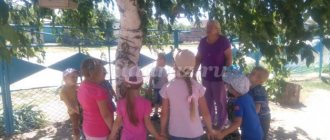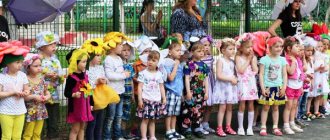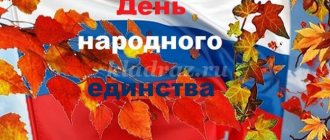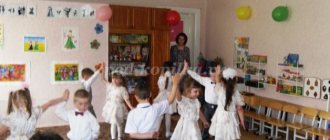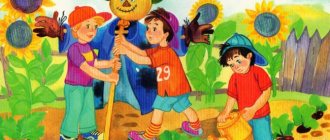Relaxing in the city on hot asphalt is hardly anyone’s childhood dream. But a noisy camp with cheerful children's laughter, lots of games, competitions, sports competitions and children's parties is exactly what every child expects after a long school year. Most parents who have sent their child to a children's summer camp at least once know what joy awaits their child upon arrival. What a lot of emotions a child experiences while there. How many positive memories children take with them from camp. Those who have never been separated from their children for a long time are wary of camps. But in vain. Let's figure out what events, competitions, and entertainment await children at the summer health camp.
Summer sports festival scenario
Coming to camp, a child does not just take a break from school. He finds himself in a new world of sports festivals and outdoor games. The child receives sensations previously unknown to him. A friendly environment, fresh air, forest or sea, perhaps a lake or river, inspires. Sports holidays help children open up, I express them. At such moments, even the most shy child becomes an awl, who is interested in everything, he gets to know the world around him.
In addition, sports events teach children friendship. They help each other, thanks to which they understand what responsibility and mutual assistance are.
Let's look at what a summer sports festival could be like using a prepared scenario as an example.
Children's sports competitions for preschoolers
Maria Balashova (Maleeva)
Children's sports competitions for preschoolers
Children's sports competitions for preschoolers
Cheerful children
Not a single sports festival is complete without fun competitions . They help develop children's intelligence, quick thinking and reaction speed.
Children's sports competitions for preschoolers:
"Snowballs"
• Everyone's favorite snowball fight. Instead of snow, each team has sheets of paper of its own color
• Participants crumple up sheets of paper and throw them at opponents
• After this, the participants begin collecting snowballs from their team into bags. Whoever collects it faster wins
"Cinderella"
• One person from each team of kids is called
• Two empty and one full containers are placed in front of the participants
• Any large items, such as pasta of different colors, are completely mixed
• The participants’ task is to place pasta of the same color into boxes
• Whoever completed the task faster wins
"Animals"
• Two teams stand in two rows. At the end of the hall there are two chairs opposite each team.
• The task of each player is to reach the finish line in the form of an animal
• The presenter says “Frog”
, and the players begin to jump like a frog, running to the chair and back
• In the middle of the competition, the presenter says “Bear,” and the next participants run to the chair and back, like a clumsy bear
• Victory will go to the team that copes well with the task and its last member is the first to reach the finish line
Fun starts: sports relay race for children
Children's sports game
The kids are looking forward to the sports festival . They are happy to help decorate the hall and hang their drawings. Both adults and children enjoy fun starts.
Sports relay races for children:
"Putters"
• Two teams line up and are given hockey sticks
• With their help you need to bring the cube to the finish line and back
"Horses"
• Ride in a bag or on a stick to the finish line and back
• The stick or bag is passed to the next participant - until victory
"No Hands"
• Two people per team carry the ball to the finish line without touching their hands. You can hold the ball with your stomachs or heads
"Crossing"
• The captain is inside the hoop - he is driving
• Runs up, picks up one participant, and they head to the finish line
• So you need to “transport”
each participant
Sports games competition for kindergarten children
Sports competition between teams
Children love fun games and competitions , so the fun should be accompanied by music.
Important: To easily attract kids to the game, you need to show by your own example how the relay race should be performed.
Advice: Conduct only those competitions whose safety you are sure of.
Children can be offered the following sports game competitions for kindergarten children :
"Driver"
The kids are divided into two teams. Each team has one toy truck with a doll or stuffed animal. Participants must pull the truck by a rope along the designated path to the finish line. Whichever team completes this task faster will be the winner.
"Mummy"
Two teams of participants are given a roll of toilet paper. One “mummy”
which needs to be wrapped in paper. Whichever team completes the task faster wins.
"Artist"
Children are given markers. There are two Whatman paper hanging on the wall. Two children come out and start drawing one of their kindergarten . The felt-tip pen is held not with your hands, but with your mouth. Whichever child finds out whose portrait is drawn first wins. The one who answered correctly goes next to draw.
Important: You can involve adults in children's competitions - dads , moms, grandparents.
"Hippodrome"
Dads help in this . An adult is a horse. The child sits on his father's back. It is necessary to "jump"
to the finish. Whoever gets there faster wins.
Scenario for the summer name day holiday
While staying at a summer health camp, there are birthday children among the children who must be congratulated on their birthday. This is very important, because a birthday is a grand holiday for every child. And if he is away from his family and gifts, this day becomes doubly special.
Each counselor knows all the kids in his troop, and once or twice a week he organizes parties to mark their name days. The number of name day holidays is regulated by the camp charter. In large camps they are celebrated every day.
Either the entire squad takes part in the celebration, or the celebration is organized for all the birthday people of the camp. Here, too, everything depends on the camp regulations.
Let's look at what a summer holiday - a name day - can be using the example of a prepared scenario.
Scenario for a summer holiday at a preschool educational institution
With the arrival of summer warmth comes the most fruitful days for activities with children. This is the best time for group work outdoors. Teachers have an excellent opportunity to prepare and conduct sports, artistic and aesthetic activities with children, for example, drawing, modeling, appliqué, and crafts from collected natural materials.
In addition, you can have conversations on the playground and watch nature. All these events awaken children's interest in the flora and fauna, increase the desire to create, to convey the beauty of what they see in drawing, modeling, and appliqué.
The cognitive sphere is considered one of the important points in planning children's events. After all, little children are young explorers who are interested and fascinated by everything. For children's holiday events, summer time is perfect. After all, it is in the summer that there are so many fresh fruits and flowers, which are extremely necessary for organizing holidays.
In addition to having fun, holiday events teach children interaction, respect, and mutual assistance. Games, songs, dances, and competitions help children make friends and feel important and irreplaceable. This is very important, because children in early preschool age are just beginning to form, they urgently need communication and interaction, a sense of team.
Everything that is instilled in them in a junior preschool institution, they will carry with them throughout their lives. The attitude at school and other educational institutions depends on the atmosphere and holiday in the kindergarten. Therefore, educators are faced with the task of helping children open up. The main tool for this is precisely a children's party.
Let's look at what a summer holiday could be like in a preschool educational institution using the example of a prepared scenario.
Preschool education
NEW APPROACHES, METHODOLOGICAL RECOMMENDATIONS
A physical education and sports festival, one of the forms of active recreation for children and adults, includes various types of physical exercises (gymnastics, outdoor and sports games, sports exercises) mainly outdoors in combination with elements of dramatization, choreography, singing, quizzes, competitions and attractions.
A holiday is always joy and fun. His anticipation alone can evoke positive emotions in a child and distract him from “going” into illness (V.L. Strakovskaya). Outdoor games, attractions, competitions, practical jokes, fun, surprises, which fill the program of any holiday, are often accompanied by spontaneous comical situations, causing sincere laughter, surprise, and delight. This circumstance alone makes the holiday an indispensable means of preventing and even treating various health disorders. It has long been known (V.V. Dineika) that a good mood and a life-affirming mood have a high healing power.
When preparing and holding physical education and sports events, children get the opportunity to show activity, initiative, independence, and creativity, which has a beneficial effect on the development of their abilities and personal qualities.
The most important result of the holiday is the joy of participation, victory, communication, and joint activities. Outdoor games, which constitute the main content of any physical education and sports festival, are more adequate than other forms of organizing motor activity, adequate to the child’s needs in movement and contribute to his harmonious physical development, development of dexterity, speed, coordination of movements, the most important moral, volitional and friendly qualities .
The process of preparing for the holiday unites the children's team, children and adults (teachers and parents) with unity of purpose and common goals. The position of educators, physical education instructors, and parents largely determines children’s attitudes toward physical education and sports. If adults lead a healthy lifestyle, regularly perform at least the simplest physical exercises with their children, are active and easy-going, this is “fertile soil on which good shoots will sprout” - strong, healthy children who love physical education.
Analysis of scientific and methodological literature and experience in organizing physical education and sports events with preschoolers, including our own, allow us to formulate the main approaches to their classification.
During any holiday, a comprehensive solution to a number of tasks is carried out that contribute to the harmonious development of the child, but at the same time the main task is set, in accordance with which the theme and content are selected, and methods and techniques of work are determined.
Based on the dominant task, we consider it appropriate to highlight the following holidays.
Create a healthy lifestyle. These are thematic holidays such as “Sun, air and water are our faithful friends”, “Cleanliness Holiday”, “Adventures of No-Sick”, “Visiting Aibolit”, etc. Properly selected thematic outdoor games and exercises in combination with text, fights between children and enemies of health (laziness, gluttony, fears, etc.) allow you to form a positive attitude towards hardening, physical education, hygiene procedures, and daily routine.
Cultivate a strong interest in physical education and sports, in personal achievements, in sporting events in our country and around the world. A characteristic feature of these holidays is the inclusion in their program of games with elements of team and individual competition and relay races. An important role is also given to the selection of educational material aimed at systematizing children’s knowledge about sports, the Olympic movement, Russian athletes, etc. The themes of such holidays are varied: “Olympians Among Us”, “Journey to Sportlandia”, “Fun Starts”.
Amuse the children and give them pleasure. These are comic entertainment holidays with the aim of creating a good mood from games, attractions, joint activities with adults, musical accompaniment, funny attributes, etc.
Develop creativity, initiative, and communication skills. A well-thought-out motivation for action (providing assistance to heroes, searching for treasure, demonstrating one’s prowess and strength), interconnected task-tests make this holiday very attractive for children 6-7 years old. Their activities in this case are less regulated: they themselves find a way out of a critical situation, enter into confrontation with the forces of evil, the elements of nature, and weather surprises. The topics are determined by the interests of children and the capabilities of adults. These are “Young Robinsons”, “Space Adventures”, “In the Underwater Kingdom”, “Rescuers”, “SOS Signal Received”.
Demonstrate sporting achievements. Such a holiday is usually combined with final events in the lives of children: the end of the school year, graduation from kindergarten (“What We Have Become,” “Growing Up”) — or seasonal changes: the end of winter, summer (“Skiing competitions,” “Bicycle racing,” "Festival of Mermaids").
Cultivate interest in folk traditions. These folklore holidays in theme and content are held in accordance with the Christian calendar (Christmas, Maslenitsa, Magpies, Trinity). They are compiled on material accessible to children using folk games, fun, round dances, songs, attributes of national clothing, and equipment.
Form cognitive activity. The goal is to expand and systematize knowledge in the field of ecology, geography, astronomy, literature, the basics of safe life, etc. Such holidays include competitions among scholars (young astronomers, ecologists, traffic rules experts, etc.): quizzes, crossword puzzles, riddles, etc. Children's knowledge and skills are tested in solving socially significant problem problems: how to save the Earth from environmental disaster; how to establish contact with extraterrestrial civilizations; how to master the rules of safe living. Traveling from era to era, across different continents, children gain basic understanding of geography, history, natural science and other sciences.
Cultivate moral qualities. Such holidays are especially significant for groups of different ages and genders, in which favorable conditions are created for the formation of friendly relationships between children and a humane attitude towards all living things. Game activities aimed at developing the readiness and skills to come to each other’s aid or rescue each other from a dangerous situation are an indispensable component of the content of these holidays. As a rule, their plot develops in two directions: on the one hand, all the children are united by one goal (to help the hero-character in trouble by confronting the forces of evil); on the other hand, children are usually divided into two or more teams (traveling sailors and aborigines, earthlings and aliens, people, animals and birds) and are involved in a joint struggle against common enemies (evil, fears, cruelty, envy).
According to motor content, holidays are divided as follows.
Combined. It is built on the basis of a combination of different types of physical exercises: gymnastics, outdoor and sports games, sports exercises. Its advantage is the ability to attract children aged 5-7 years to competitive activities with elements of sports, and junior and middle preschoolers to perform simple gymnastic exercises and participate in outdoor games and fun.
Based on sports games (holding championships in football, basketball, hockey, etc. between parallel groups). Such a holiday can be organized if the children have a good command of the technique of the game and are familiar with its rules. To attract all children to participate, you can organize dance performances for girls and games for fans between halves. If the level of motor preparedness of children is not high enough, then the holiday can take the form of competitions between teams on the speed and quality of performing individual elements of sports games (dribble the ball and throw it into the basket; hold a tennis ball longer on the racket; hit the shuttlecock with a racket in a circle, etc. .). You can also include relay games and games with elements of individual and collective competitions into the holiday.
Based on sports exercises. Such holidays are organized by combining several seasonal sports (for example, skiing, sledding in winter or cycling, rollerblading, scootering in summer). The content of the holiday may include sports exercises of one type (for example, swimming).
Based on outdoor games, attractions, fun. This is the most common type of holiday. It does not require complex equipment or a specially equipped area (it can be carried out in a clearing or compacted path). The universality of the holiday lies in the fact that children of all ages and adults can be involved in it.
Integrated. The content of these holidays, along with motor tasks, includes elements of cognitive, visual activity, theater, etc.
According to the methods of holding holidays, the following varieties are distinguished.
• Games (carried out with children of all ages).
• Competitive (conducted with children 5-7 years old). Participants of two or more teams compete with each other, or all children enter into confrontation with a real or imaginary character.
• Plot. Motor tasks are performed in accordance with the leader’s story, and all games and exercises are connected by a single theme and idea.
• Creative. Their goal is to develop creative activity, the ability to make decisions independently, and initiatives (problem situations and tasks, puzzle tasks, provocative questions, search questions, group discussion methods, etc.). Holding such holidays requires high professionalism from an adult, since unexpected decisions of children can change the course of the scenario. Therefore, the scenario includes different options for exiting the proposed situation so that children feel responsible for the course and results of their actions.
Note. The classification of holidays according to the method is quite arbitrary: any of them uses a wide arsenal of methods and techniques for teaching and raising children. Therefore, we are talking about the preferential use of any method.
According to the location of the holidays, they are divided as follows:
• on a sports ground or stadium;
• in natural conditions (in a forest, near a pond, in a park);
• in the gym;
• in a swimming pool.
Based on the composition of children, it is most expedient to classify holidays as follows.
Children from 4 to 7 years old and adults can participate in the holiday As a rule, it is based on outdoor games, attractions and amusements, in which all children participate (one at a time or in small groups of the same age), and in mass games, round dances and dances, everyone takes part at the same time.
• The holiday can be organized by bringing together children of the same age or close in age. If it is based on games with elements of competition or sports games, then the participants are children 6-7 years old. If this is an entertainment holiday in which story games and musical surprises predominate, children 4-5 years old can become participants.
• The holiday can be held as a fun competition in which parents, grandparents, brothers and sisters participate. General and individual game tasks and mass comic relay races are determined, which include children 2-3 years old (the task is to crawl between the legs of their brothers and sisters) and grandmothers (the task is to dress their grandson as quickly as possible).
The classification of holidays according to the nature of the equipment, inventory, and benefits used is very conditional: if the kindergarten’s equipment with physical education, sports and gaming equipment is insufficient, this is not a reason to deprive children of a holiday - an adequate replacement for the specified equipment can be found.
• Using sports, physical education and tourism equipment.
• Using natural materials ( autumn leaves, flowers, snow buildings, pieces of ice, snowballs, cones, pebbles, stumps, logs, etc. - depending on the season and natural environment).
• Using homemade or adapted equipment . Tires of different sizes can be used (from which you can construct a variety of projectiles), a ladder, a clothesline, household items, children's furniture (chairs, stools), even plastic bottles filled with sand, etc.
• With story-based toys and play aids for young children ( dolls, animals, cars, rolling toys, building materials).
The classification of holidays depending on the season is traditional. (These are four seasonal holidays.)
The methodology for organizing any holiday is a rather complex process, including the stages of preparation, holding and summing up.
Preparation for the holiday includes drawing up a script, distributing roles and responsibilities between participants, selecting musical accompaniment, decorating the site or hall, preparing sports uniforms, emblems, invitations, etc. The preparatory work can be led by a physical education instructor or teacher. Older brothers and sisters and parents can provide very tangible help. The organizers of the holiday determine its type depending on the season, the age of the participants, the availability of equipment, and the interests of the children.
The duration of the holiday is determined by the age of the participants: 45-50 minutes for children 4-5 years old; 60-90 minutes for children 6-7 years old. If children of different ages and adults participate in the holiday, then the duration of children’s participation is determined by their mental and physical capabilities. However, in any case, the holiday should not last more than 2 hours, otherwise fatigue sets in, reducing interest in what is happening.
When drawing up a holiday plan-scenario, it is necessary
• ensure a gradual increase in physical and mental stress;
• provide for alternating games and competitions with high physical activity and emotional intensity and tasks aimed at relieving tension;
• alternate mass and individual games and tasks (if possible);
• provide for the participation and assessment of the activities of each child, taking into account his individual characteristics and capabilities;
• combine games and tasks that are familiar to children and evoke a positive emotional state with the inclusion of new attributes, music, and characters.
The most interesting part of the preparatory stage is the production of attributes, posters, decorations, emblems and prizes for participants, invitation cards for fans and relatives. This type of work is quite within the capabilities of older preschoolers under the guidance of an adult. Note that it is not necessary to purchase expensive prizes: it is not the cost that is important to the child, but the love and attention that is shown to him. Therefore, adults must first of all know the individual characteristics of each participant so that the prize becomes truly valuable to him.
...The “Space Travel” holiday was planned in kindergarten. There were no funds available to purchase prizes. Adults thought for a long time what to give to children who were supposed to “return from a long journey to the planets of the solar system.” And... they collected colorful stones, washed them, polished them and painted intricate hieroglyphs on them. Imagine the amazement of the children who discovered pebbles of “unearthly origin” in their shoes - gifts from the inhabitants of another civilization... The surprise prizes made by the children for the rival team are educationally valuable. These can be drawings, crafts made from natural and waste materials, etc.
For mass celebrations, you can make simple but cute souvenirs (a balloon, an apple, a chocolate medal, etc.). Most importantly, every child should be rewarded regardless of the place they take.
Particular attention should be paid to the selection of music and the preparation of means for its broadcast. Musical accompaniment provides an appropriate emotional mood, helps synchronously perform physical exercises, fills pauses, concentrates children's attention, and signals the beginning and end of a game-task. You should consider musical accompaniment of physical exercises (parade, rhythmic or morning exercises) and musical screensavers, background music for attractions, surprise moments, awards, etc.
Holiday scenarios usually include performances by children reading poetry, performing songs, and performing magic tricks. Naturally, you can’t do without preparation here. However, you should abandon rehearsals, drills and training sessions! Remember that the holiday is organized for children, not spectators and guests. Therefore, impromptu, live, relaxed communication is appropriate, rather than elaborate and memorized scripted dialogue with children’s pre-learned answers. Rehearsing surprise moments in the presence of celebration participants is absolutely unacceptable. The absence of a sacrament, a miracle designed to bring surprise, insight, delight, makes the holiday a boring event with a predetermined end.
The celebration must be entrusted to a host Experience suggests: 80% of the success of the holiday depends on the preparation and abilities of the host. He must be artistic, be able to manage a group of children, know and take into account their characteristics, change the script if necessary during the course of the event and regulate physical, mental and emotional stress. It is advisable that the presenter be athletic and able to perform this or that exercise himself, if necessary.
You can make the task of holding a holiday easier by including in the script two presenters who are able to “insure” each other if an unforeseen situation arises.
On the day appointed for the holiday, in the morning an atmosphere of anticipation of general fun should already be created. Each child (or group of children), together with the teacher or his assistant, is responsible for a specific part of the preparatory work: someone distributes invitation cards, someone arranges benches, hangs festive garlands, balloons, sets up a scoreboard... The professionalism of the organizers also lies in involve everyone in the process of preparing the holiday, do not suppress the initiative of children, but provide them with the opportunity to feel like full owners of the event.
The structure of the holiday is varied and depends on its type. Conventionally, it can be divided into three parts.
The first, the introductory part, can be organized in the form of a parade of participants with the raising of the flag and lighting of the Olympic torch. A good tradition could be a mass jog across the territory of the kindergarten of all participants and fans, including adults; the unexpected appearance of fairy-tale characters or barkers who invite everyone to take part in mass games, attractions and fun. In winter, the holiday can begin with the movement of a long sleigh train or three horses. The beginning of holidays and games of rescuers, travelers, and cosmonauts could be different: an alarm that calls on all the strong and brave to take part in rescuing animals affected by floods (fire, earthquake, etc.). There are many options...
The main part of the holiday, aimed at solving its main task, is filled with appropriate motor content: games, competitions, attractions. It is important to ensure that every child participates in them. If the scenario is designed to alternate participation of members of different teams in games, it is necessary to consider how to ensure the participation of everyone. Usually in response to challenging questions like “Who is our bravest?” or “Who wants to play this game?” the same children respond, while the shy and indecisive ones remain out of work. In this case, you can do this: each child, upon entering the hall, receives a ticket (tickets can be of different colors, shapes, etc.); During the holiday, the host invites only those who have a ticket in the shape of a red circle to participate in any game, and those children who have a ticket in the shape of a hare to participate in the “Jumpers” competition. Tickets should be handed out by an adult who knows the characteristics of each child well, so that he does not feel out of place. So, if a boy gets a ticket with a picture of a jump rope, but he doesn’t know how and doesn’t like this exercise, then he will feel disadvantaged when paired with a girl or simply refuse to participate. Therefore, you need to decide in advance who to give which ticket to avoid negative emotions.
If the holiday is of a mass nature, then the presenter should have several assistants from among teachers or schoolchildren who will help arrange and remove equipment, provide musical accompaniment, and present gifts.
At a festival with a pronounced competitive focus, it is important to timely evaluate the performance of individual participants or teams. To do this, a jury of three to five people is selected in advance and a scoreboard is placed in a visible place. It can be traditional or unusual (for example, basketball baskets into which balls are thrown - one for each team victory). At the end, the points or goals earned by the team are counted. Another option for summing up the results could be to build a tower from building material: whose tower is higher, he won, etc.
to sum up both during and at the end of the holiday. After each relay game or competition, the presenter can sum up the results himself and evaluate the physical, moral and volitional qualities of the teams as a whole and individual players. It is wiser to give the jury the floor after two or three competitions, so as not to turn the holiday into continuous performances by adults.
The presenter needs to be very delicate when summing up: children are vulnerable, they cannot adequately assess their abilities and experience failures painfully. Therefore, it is necessary, firstly, to form teams correctly: they should be approximately equal in strength and with an equal number of boys and girls; secondly, talk tactfully about victories and defeats, maintain a spirit of optimism and confidence in children. At the end of the holiday, you can plan a game in which the losing team's victory is guaranteed. For example, the presenter offers both teams the outdoor game “Trap”. When catching up with the children, he only insults the players from the winning team. This helps to offset the clear advantage of one of the teams. As a result, by the end of the holiday, “friendship wins”! The organizers can use another way to equalize the results: one team is awarded in the category “The most dexterous and fastest”, the other - “The most friendly and cheerful”.
The culmination of any holiday is a surprise moment. Its content and time of inclusion in the course of the holiday depend on the age of the participants and the type of holiday. Most often, the unexpected appearance of fairy-tale characters (adults or older children) and the performance of a short performance are used as a surprise moment. Characters can invite children to play with them, solve a problem they are facing together, or teach them to do physical education. In any case, the performance should be spectacular and fun and accompanied by music and unusual sounds (for example, a whistle announces the appearance of the Robber Nightingale, the clatter of hooves - a troika). If the holiday is held indoors, you can apply lighting effects (sudden blackout, lighting the place where the hero appears with lanterns, etc.).
At the end, it is appropriate to hold a general game of medium mobility (preferably in a circle) such as “Mousetrap”, “Carousel”, or organize a mass dance.
The award ceremony should be solemn and fun. Pennants, emblems, souvenirs can be placed in the most honorable place in the group (sports corner, information stand for parents). If these are individual prizes and the children want to take them home, advise parents to find a place in the children's room (shelf, closet) where the prizes will be visible to everyone. Such a “victorious” corner is a source of pride for a child. Here you can place photographs and drawings on the theme “Our holiday”. This will allow children to develop a strong interest in physical education and their achievements in sports, which is one of the most important conditions for developing motivation for a healthy lifestyle.
N. BOCHAROVA, Candidate of Pedagogical Sciences, Associate Professor, Oryol State University
Bocharova N. Physical education and sports events in kindergarten: new approaches, methodological recommendations // Preschool education. 2004. No. 1. P. 46-51.
